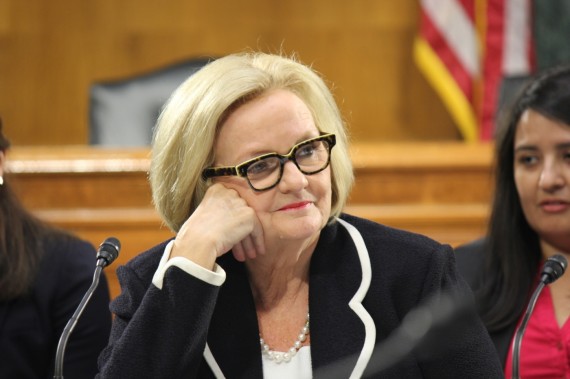WASHINGTON – Campus administrators, lawmakers, police officers and victim advocates convened Monday on Capitol Hill to discuss how to address sexual assaults on campus.
This was the third roundtable discussion held by Sen. Claire McCaskill, D-Mo., to see what lawmakers can do to encourage more reporting of sexual assaults and promote campus activism.
McCaskill plans to offer amendments to the Higher Education Act when it comes up for reauthorization later this year.
“Campuses that say they don’t have a problem are lying or denying or are incompetent,” McCaksill said.
The White House estimates that nearly 20 percent of women report being raped while in college, and the Centers for Disease Control and Prevention says that one in 71 men reports being raped.
The panelists agreed that the biggest obstacle preventing change is the lack of reporting. Lack of protocols, varying state statues for consent, funding and alcohol consumption complicate the problem.
Nancy Chi Cantalupo, research fellow at the Victim Rights Law Center and adjunct professor at Georgetown University Law Center, described underreporting as “a veto on the system.”
Sen. Richard Blumenthal, D-Conn., said many survivors don’t want to come to police.
“You can’t have punishment without reporting,” he said.
“Some may only ask to not see their assailant in the dining hall,” Alexandra Brodsky, a Yale law student and the founder of the advocacy group Know Your IX said, “and some might want to see that their assailant is expelled.”
While schools are focused on providing equality, police need to be able to gather evidence to press charges. But unless victims come forward quickly, an investigation is difficult.
Carrie Hull, a detective at the Ashland, Ore., Police Department, said she changed the way her department investigates sexual assault cases by meeting the needs of victims. She said the traditional method of questioning victims can create an emotional burden and produce lackluster evidence. Depending on the severity of the crime and the age of the victim, the state’s statute of limitations can range from three to 12 years.
Each deputy is trained to perform forensic interviews and the audio is recorded, she said.
College campuses are required under the Jeanne Clery Act to issue a timely warning to students after a report of a sexual assault, but the warnings can be a double-edged sword. Vague reports, McCaskill said, propagate the myth that “there are strangers in the bushes waiting to attack,” and if the reports are too specific, they may identify a victim to the entire college. Conversely, withholding information could give serial rapists a chance to attack again.
Brodsky warned against campus police using timely warnings as leverage points, because doing so could place added guilt on the survivor.
“You’re damned if you do, and you’re damned if you don’t,” McCaskill said.
A better option than changing policing, panel members said, may be changing the culture.
At Connecticut College in New London, Conn., administrators have been fighting so-called rape culture by encouraging a bystander prevention program called Green Dot.
“Clery crime statistics are very misleading,” Mike Jungers, dean of students at Missouri State University in Springfield, Mo., said. Many rapes occur off-campus, and aren’t included in the yearly Clery Act report.
Kathy Zoner, chief of the Cornell University Police, agreed with Folsom’s culture-shifting strategies.
“We’re dealing with people who have been socialized for 18 years with the idea that ‘boys will be boys’ and that ‘girls will be polite,’” she said.
Zoner called for increased funding for educational programs to start sexual-assault discussions earlier in life.
“These things have to be dealt with in elementary and middle school,” Folsom said.
McCaskill agreed, because “many young people don’t understand rape.”
She said colleges need to increase access to nurses who are trained to administer rape kits with appropriate bedside manner and to produce useful evidence for police.
No matter what changes end up in the Higher Education Act, McCaskill and Blumenthal were unsure about how the Department of Education could enforce the new requirements. If a school doesn’t follow the requirements of the Clery Act or Title IX, the only current penalty is the loss of all federal funding, which has never happened.
McCaskill said new legislation has to be “something other than an idle threat.”
Blumenthal warned against a “nuclear option,” which could harm the students they’re trying to protect.
Even though legislation hasn’t even been drafted yet, members of the panel agreed that a culture shift is ongoing.
“When you break from traditional methods and identify perpetrators,” Hull said. “That is a form of prevention. We’re sending a message that you can’t keep people silent.”
Reach reporter Daniel Wheaton at [email protected] or 202-236-9871.









